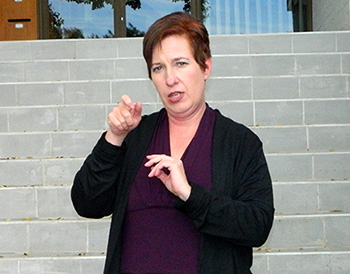Latest News Archive
Please select Category, Year, and then Month to display items
12 January 2024
|
Story Nonsindiswe Qwabe
|
Photo Sonia Small
 Since joining the UFS in 2008, Dr Grey Magaiza has worked extensively on approaches that can foster the socio-economic transformation of societies.
Since joining the UFS in 2008, Dr Grey Magaiza has worked extensively on approaches that can foster the socio-economic transformation of societies.
“The future should be one where communities can decide on their development agenda and futures. That’s the most important for me.” Dr Grey Magaiza, Deputy Director of the Centre for Gender and Africa Studies (CGAS) and Head of the Community Development programme on the Qwaqwa Campus, is passionate about capacitating communities to be agents of change and advancement. His vision for the future emphasises the empowerment of communities to take charge of their development by actively participating in decision making and the implementation of development projects that can improve their lives.
Since joining the UFS in 2008, Dr Magaiza has worked extensively on approaches that can foster the socio-economic transformation of societies. Over the years, he has crafted his research speciality into one that he is most proud of – being an interdisciplinary scientist immersed in the development of communities.
“I’m in a fortunate position of researching what I like. I say ‘fortunate’, because I’ve taken the time to understand what I’m passionate about, which is the overall field of rural livelihoods and livelihood futures – in short, community development. My research starts from an engaged university, understanding the elements that a university must use to enhance transformation and relevance to its immediate community in terms of development.”
One of the ways he has done this is by looking at social entrepreneurship as a development approach for young people in a rural setting. Through workshops with non-profit and civic organisations in Qwaqwa, Dr Magaiza has been helping these organisations to map out their needs and actively meet them through the involvement and support of external role players.
“We understand that communities are part of the national development agenda, but even that national agenda respects community knowledge and intentions and allows communities to shape their identity. A critical enabler of this is community organising. You bring back the capacity in communities to have dialogues on issues affecting them as spaces for engagement, knowledge exchange, and for people to just talk about their way forward.”
By enabling communities to define their development agenda, they can address their specific needs, challenges, and aspirations, he said. “When I look at livelihood futures, it’s quite an exciting aspect of my work – it’s like looking into a fortune tellers’ globe, because you’re not deciding for communities what they should do, but the communities themselves take those decisions.”
Martie Miranda one of only 10 SATI accredited sign language interpreters in South Africa
2015-04-23

Martie Miranda
Photo: Stefan Lotter |
The University of the Free State is privileged to have one of the top South African Sign Language (SASL) Interpreters as a staff member at the Unit for Students with Disabilities (USD).
Martie Miranda recently passed the accreditation exam of the South African Translators Institute (SATI), joining Dr Philemon Akach, previous HOD of the South African Sign Language Department of the UFS, in becoming one of only 10 SASL interpreters to be SATI accredited.
SATI is a professional association for language practice professionals in South Africa. Voluntary accreditation is offered at a professional level, ensuring a high standard of language practice. The system has become widely recognised, and is used as a recommendation or prerequisite for job applications by a number of institutions, including the South African government, particularly after the infamous ‘Jantjies incident’ with the funeral service of the late President Nelson Mandela.
Martie, a proud Child of Deaf Adults (CODA), has 18 years’ experience in SASL interpreting, lip speaking interpreting, and community interpreting as well as 15 years’ experience of conference and seminar interpreting. She boasts a Level 2 Advanced Interpreting qualification, and she has been mentoring Level 1 SASL interpreters for the past six years. Her extensive interpreting experience on a national and international level also includes Deafblind interpreting as well as Court and Legislature interpreting. She has interpreted three theatre productions, and has been coordinating the SASL services at the UFS since January 2009. She is responsible for the student management of all the hearing-impaired students at the USD.
Martie completed her BML degree (cum laude) at the UFS Business School in 2013, and received the award for top achiever in the programme during her final year. She will enrol for her MBA at the UFS Business School in July 2015.